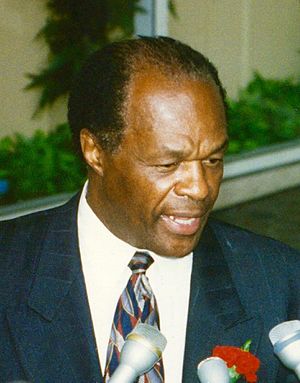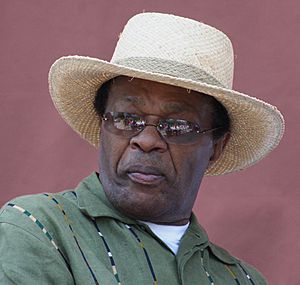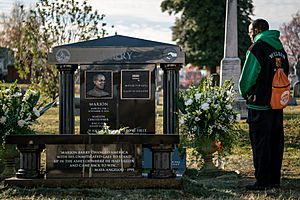Marion Barry facts for kids
Quick facts for kids
Marion Barry
|
|
|---|---|
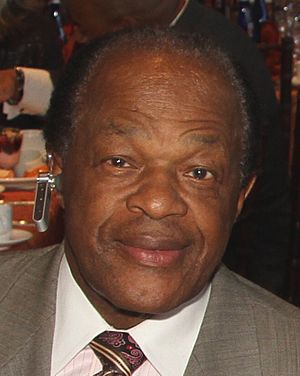 |
|
| 2nd and 4th Mayor of the District of Columbia | |
| In office January 2, 1995 – January 2, 1999 |
|
| Preceded by | Sharon Pratt Kelly |
| Succeeded by | Anthony Williams |
| In office January 2, 1979 – January 2, 1991 |
|
| Preceded by | Walter Washington |
| Succeeded by | Sharon Pratt Kelly |
| Member of the Council of the District of Columbia from Ward 8 |
|
| In office January 2, 2005 – November 23, 2014 |
|
| Preceded by | Sandy Allen |
| Succeeded by | LaRuby May |
| In office January 2, 1993 – January 2, 1995 |
|
| Preceded by | Wilhelmina Rolark |
| Succeeded by | Eydie Whittington |
| Member of the Council of the District of Columbia At-Large |
|
| In office January 2, 1975 – January 2, 1979 |
|
| Preceded by | Position established |
| Succeeded by | John Ray |
| Chairman of the Student Nonviolent Coordinating Committee | |
| In office 1960–1961 |
|
| Preceded by | Position established |
| Succeeded by | Charles McDew |
| Personal details | |
| Born |
Marion Barry Jr.
March 6, 1936 Itta Bena, Mississippi, U.S. |
| Died | November 23, 2014 (aged 78) Washington, D.C., U.S. |
| Resting place | Congressional Cemetery |
| Political party | Democratic |
| Spouses | Blantie Evans (1962–1964) Mary Treadwell (1972–1977) Effi Slaughter (1978–1993) Cora Masters (1993–2014) |
| Children | Marion (with Effi Barry) |
| Education | LeMoyne-Owen College (BS) Fisk University (MS) University of Kansas, Lawrence University of Tennessee, Knoxville |
Marion Shepilov Barry (born Marion Barry Jr.; March 6, 1936 – November 23, 2014) was an American politician. He served as the second and fourth mayor of the District of Columbia. His terms were from 1979 to 1991 and again from 1995 to 1999.
A Democrat, Barry also served three times on the Council of the District of Columbia. He was an at-large member from 1975 to 1979. Later, he represented Ward 8 from 1993 to 1995 and from 2005 to 2014.
In the 1960s, he was active in the civil rights movement. He was part of the Nashville Student Movement. He also served as the first chairman of the Student Nonviolent Coordinating Committee (SNCC). Barry became well-known as mayor of the nation's capital. He was the first major civil rights activist to lead a large American city.
In 1990, he faced legal challenges that led to his arrest. This event prevented him from running for re-election. He spent six months in a federal prison. After his release, he was elected to the Council of the District of Columbia in 1992. He was then elected mayor again in 1994.
Despite his political ups and downs, Barry was a popular figure in Washington, D.C.. The Washington City Paper called him "Mayor for life." The Washington Post once said, "to understand the District of Columbia, one must understand Marion Barry."
Contents
- Early Life and Growing Up (1936–1954)
- Education and Civil Rights Work (1955–1970)
- Leading in Education (1971–1974)
- Serving on the D.C. Council (1974–1979)
- Mayor of the District of Columbia (1979–1991)
- Political Comeback (1992–1994)
- Fourth Term as D.C. Mayor (1995–1999)
- Later Years on the D.C. Council (2000–2014)
- Personal Life
- Passing Away
- Legacy
- See also
Early Life and Growing Up (1936–1954)
Marion Barry was born in Itta Bena, Mississippi. He was the third child of Mattie Cummings and Marion Barry. His father passed away when Marion was four years old. A year later, his mother moved the family to Memphis, Tennessee. She found better job opportunities there.
His mother married David Cummings, a butcher. Together, they raised eight children. Marion grew up on Latham Street in Memphis. He went to Florida Elementary and graduated from Booker T. Washington High.
Marion first noticed racial unfairness when he had to walk to school. White students were given a school bus to ride. Schools and public places were separated by race back then. As a child, he had many jobs. He picked cotton, delivered newspapers, and bagged groceries. At 17, he earned the rank of Eagle Scout.
His civil rights activism began as a paperboy. His newspaper held a contest. Boys who got 15 new customers could win a trip to New Orleans. Marion and other black paperboys met the goal. But they were not allowed to go to New Orleans, which was a segregated city. The paper said it could not afford two buses to follow segregation rules. Marion decided to boycott his paper route. He stopped working until they agreed to send the black paperboys on a trip. The paper then offered a trip to St. Louis, Missouri, which was not segregated. Marion then went back to his paper route.
Education and Civil Rights Work (1955–1970)
College Studies and Early Activism
Barry attended LeMoyne–Owen College in Memphis. He graduated in 1958. In his junior year, he started to truly understand racial injustice. He and his friends went to a segregated fairground to see a science exhibit. A policeman stopped them and asked them to leave. Barry and his friends left without arguing.
At that time, Barry became more active in the NAACP. He served as president of the NAACP chapter at LeMoyne-Owens. Some say his strong support for civil rights earned him the nickname "Shep." This referred to a Soviet politician named Dmitri Shepilov. Barry later said he chose "Shepilov" as his middle name because he liked it.
In 1958, he spoke out against a college trustee. The trustee made comments he felt were disrespectful to African Americans. Barry almost got expelled for this. He wrote a letter to the college president. He asked if the trustee could be removed from the board. The letter was published in the school newspaper and then in a Memphis paper.
Graduate School and SNCC Leadership
Barry earned a Master of Science degree in organic chemistry from Fisk University in 1960. He was a member of the Alpha Phi Alpha fraternity. While at Fisk, Barry was arrested several times. He took part in the Nashville sit-ins to end segregation at lunch counters. After graduating, Barry continued his civil rights work. He focused on ending racial separation on buses.
In 1960, Barry was chosen as the first chairman of the Student Nonviolent Coordinating Committee (SNCC). He helped start a project in McComb, Mississippi. This project focused on both voter registration and direct action. Barry and other activists lived with local people. This helped them stay safe and understand the community.
Barry began studying for his doctorate at the University of Kansas. But he soon left the program. He thought about law school to help with his activism. But he decided against it. He didn't want to take a year off and risk being drafted into the military.
He then went to the University of Tennessee in Knoxville. He was the only African American in the chemistry doctoral program. He learned he could not tutor white children. His wife, Blantie Evans, was not allowed to work at the white school. He left the program to focus on his duties at SNCC.
Working for Civil Rights
As head of SNCC, Barry led protests against racial segregation. He worked to convince state lawmakers to recognize the Mississippi Freedom Democratic Party (MFDP). This party was formed by African Americans to show they wanted to vote.
In 1965, Barry and Evans moved to Washington, D.C.. They opened a local SNCC chapter. He helped organize peaceful street protests. He also led a boycott against bus fare increases. Barry arranged rides to work for those who needed them. The boycott cost the bus line a lot of money. This showed Barry's strong organizing skills.
He also led the Free D.C. Movement. He strongly supported more home rule for D.C. At the time, a Congressional committee controlled the district. Barry left SNCC in 1967.
In 1967, Barry and Mary Treadwell started Pride, Inc. This program helped unemployed black men get job training. The group hired hundreds of teenagers to clean streets and alleys. Barry and Treadwell later married in 1972. They separated five years later.
Barry was active after the 1968 Washington, D.C. riots. These riots followed the assassination of Martin Luther King Jr.. He organized a free food program through Pride Inc. This helped poor black residents whose homes were damaged. Barry convinced the Giant Food supermarket chain to donate food. He spent a week delivering food to housing projects. He also joined the city's Economic Development Committee. He helped direct federal funds to black-owned businesses recovering from the riots.
Leading in Education (1971–1974)
In 1971, Barry ran for a seat on the school board. He wanted the school board to focus on "issues of education." Barry won the election with 58 percent of the vote.
After joining the board in 1972, he was chosen as its president. He served for two years. He helped fix the school system's money problems. He also helped the board work together better.
Barry supported a bigger budget for education. He also wanted raises for teachers. He supported Barbara Sizemore becoming the district's superintendent. This made D.C. the first major city with a woman leading its school board.
When the Senate delayed payments to D.C., Barry spoke out. He said it showed some in Congress believed black people could not manage money well.
Serving on the D.C. Council (1974–1979)
When Washington's home rule began in 1974, Barry was elected to the city's first elected city council. He chaired the Committee on Finance and Revenue. He was re-elected in 1976.
While on the D.C. City Council, Barry was accidentally shot. This happened on March 9, 1977, during a hostage situation at the District Building. The event was called the 1977 Hanafi Siege. Barry recovered from his injury.
Becoming Mayor in 1978
With his background as an activist and legislator, Barry ran for mayor in 1978. He had also been seen as a "hero" during the hostage crisis. He ran with the slogan "Take a Stand." He promised to improve the city's administration.
Barry won the Democratic primary election. He defeated the current mayor, Walter Washington. The vote was very close. Barry then won the general election easily in November. He became the city's second popularly elected mayor in January 1979.
Mayor of the District of Columbia (1979–1991)
First Term as Mayor
Barry's first four years as mayor focused on making city services more efficient. This included the sanitation department. He also started his well-known summer jobs program. This program offered summer work to all school-aged residents.
Barry also worked to fix the city's money problems. He controlled spending and reduced the city's workforce. Each year of his first term, the city had a budget surplus. A D.C. political reporter described his first administration as "methodical, competent, and intellectually superior."
However, unemployment and crime rates increased during this time. This was partly because many police department jobs were cut. The city's debt was also a constant challenge.
Second Term and Challenges
In 1982, Barry was re-elected. He won with over 58% of the vote in the primary. He then won 82% in the general election.
His second term faced more difficulties. Washington had a big real estate boom, which helped the city's money issues for a while. But government spending also increased greatly. The city struggled with a large budget deficit.
Wasteful spending on contracts became a problem. Barry had a policy to give a percentage of contracts to minority-owned firms. But in his second term, some contracts went to his political supporters. There wasn't enough oversight of these contracts.
Major issues arose in his second term. Some of his associates faced legal problems related to finances. Despite this, Barry had some high points. The District received a high credit rating for its bonds. Barry also gave a nomination speech for Jesse Jackson at the 1984 Democratic Convention.
Third Term and Health Concerns
Barry ran for a third term as mayor in 1986. He easily won the Democratic primary. He then defeated Republican city councilwoman Carol Schwartz in the general election. However, Schwartz received a higher percentage of votes than any Republican before.
By this time, his public appearances showed signs of health issues. His aides started scheduling his daily events later in the day. His ability to work as mayor was affected. The city also faced problems during this period. For example, city crews were criticized for badly handling snow removal during a blizzard in 1987.
Legal Challenges and Prison Time (1990)
In January 1990, Marion Barry faced legal challenges that led to his arrest. As a result, he decided not to run for re-election as mayor in June 1990. He continued to serve as mayor during his trial.
Barry was sentenced to six months in federal prison. He lost the election for an at-large council seat. This was his first and only election loss. In October 1991, Barry began his sentence at a correctional facility in Petersburg, Virginia. He was later moved to a federal prison in Loretto, Pennsylvania. Barry was released in April 1992.
Political Comeback (1992–1994)
Return to the D.C. Council
Barry was released from prison in 1992. Two months later, he decided to run for the Ward 8 city council seat. He ran with the slogan "He May Not Be Perfect, But He's Perfect for D.C." He won the Democratic primary with 70 percent of the vote. He then easily won the general election.
Running for Mayor Again (1994)
Despite earlier statements, many believed Barry would run for mayor in 1994. He announced his candidacy on May 21, 1994. He was seen as a strong challenger to the current mayor, Sharon Pratt Kelly. Barry won the Democratic primary with 48% of the vote.
After his primary victory, Barry famously told voters who opposed him to "get over it." He then faced Republican councilmember Carol Schwartz in the general election. Barry won with 56% of the vote. This was the first time a Democratic mayoral candidate received less than 60% of the vote since home rule began.
Fourth Term as D.C. Mayor (1995–1999)
Barry became mayor again on January 2, 1995. He immediately faced a financial crisis. The city's money problems had grown worse. City services were also not working well. Barry said the city government was "unworkable." He asked Congress to take over some city operations.
Instead, Congress created the District of Columbia Financial Control Board. This board took complete control over the city's spending and finances. It could even overrule the mayor's financial decisions.
The next two years involved many battles between Barry and the control board. In 1997, a new law was passed. It saved the city from its financial crisis. But it took away most of Barry's power over nine city agencies. He was left with control over only Parks and Recreation, public libraries, and tourism.
Barry decided not to run for a fifth term in June 1998. He believed Congress would not give full home rule back while he was mayor. Anthony A. Williams succeeded him as mayor.
Later Years on the D.C. Council (2000–2014)
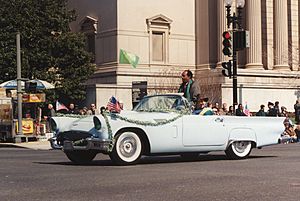
After leaving the mayor's office, Barry worked as a consultant. On June 12, 2004, he announced he was running for the Ward 8 council seat again. This was a position he held before becoming mayor. Barry won the Democratic primary with 58% of the vote. He then won the general election with 95% of the vote.
During the 2006 mayoral election, Barry supported Adrian Fenty. Barry often disagreed with Fenty, especially about a proposed soccer stadium in his Ward 8. Barry was a strong supporter of the stadium.
In July 2007, Marion Barry was chosen as one of fifty wax statues for the Madame Tussauds Wax Museum in Washington D.C. He was chosen by a majority of residents and tourists.
Barry ran for re-election in 2008 and easily won. He defeated all five challengers in the Democratic primary.
Vote on Marriage Equality
In May 2009, Barry voted against a bill. This bill would have recognized same-sex marriages performed in other places. During his 2008 campaign, Barry had suggested he would support such a bill. After his vote, he was criticized for changing his position.
Barry said his position had not changed. He warned that the council needed to move slowly on this issue. He believed that the local African-American community was strongly against marriage equality. He said, "All hell is going to break loose."
Later Legal Issues
Tax Return Problems
On October 28, 2005, Barry pleaded guilty to minor charges. These charges came from an IRS investigation. On March 9, 2006, he was given three years of probation for not paying federal and local taxes.
In 2007, prosecutors tried to end his probation. They said he failed to file his 2005 tax return. But a judge refused, saying they didn't prove he did it on purpose.
On February 9, 2009, prosecutors again tried to end his probation. They said he didn't file his 2007 tax return. A prosecutor said Barry had not filed his taxes for eight of the last nine years. Barry said medical problems distracted him. He had been getting dialysis for a kidney problem. He later received a kidney transplant. The prosecution withdrew their request to end his probation in April 2009.
On September 9, 2011, the IRS filed a tax lien against Barry. This was for $3,200 in unpaid federal income taxes for 2010. Barry blamed it on poor communication.
Traffic Incidents
On September 10, 2006, Barry was stopped by Secret Service police. He was given a ticket for running a red light. He was also charged with driving an unregistered vehicle. A judge later found him not guilty.
On December 16, 2006, the Park Police stopped Barry for driving too slowly. The officer told Barry his license was suspended. But the D.C. Department of Motor Vehicles later confirmed his license was not suspended. It was a computer error.
On August 2, 2014, Barry was in a traffic accident. His spokesperson said it was due to a "hypoglycemic attack" from his diabetes. At the time, Barry had unpaid tickets for speeding and parking violations.
Conflict of Interest Report
In July 2009, Barry was briefly taken into custody. This was after an ex-girlfriend claimed he was stalking her. All charges were dropped soon after.
An investigative report later said Barry had personally benefited from a contract. He had given this contract to his then-girlfriend. The report said she used the money to repay him. She also admitted to copying parts of her study from a public report. The report also said Barry had requested many special funds, some of which went to organizations with problems. It also said Barry made the investigation difficult.
Barry said he had not broken any rules. He apologized for his "very, very poor judgment." On March 2, 2010, the D.C. Council voted to remove Barry from all his committee assignments.
Personal Life
Barry married Effi Slaughter, his third wife, in 1978. They had one son, Marion Christopher Barry, who passed away in 2016. The Barrys separated in 1990 and divorced in 1993. Effi passed away on September 6, 2007, after a battle with acute myeloid leukemia.
Barry married Cora Masters on January 8, 1993. She was a political science professor and his former spokeswoman. Barry's mother, Mattie Cummings, passed away in 2009 at age 92.
During his first three terms as mayor, Barry lived with his family in the Anacostia section of D.C.
Passing Away
Marion Barry passed away at United Medical Center in Washington, D.C., on November 23, 2014. He was 78 years old. His death was caused by cardiac arrest. After three days of memorial events, he was buried on December 6 at Washington's Congressional Cemetery.
A private monument was placed over his grave. It was unveiled on November 22, 2016. Many D.C. leaders, family, and friends attended the event. His wife, Cora Masters Barry, and son, Marion Christopher Barry, helped design the memorial.
Legacy
In June 2009, a documentary about Barry's life was released. It was later shown on HBO in August 2009.
In April 2014, during a mayoral election in Newark, New Jersey, Ras Baraka named Barry as one of his role models for a mayor.
See also
 In Spanish: Marion Barry para niños
In Spanish: Marion Barry para niños
- List of Alpha Phi Alpha brothers
- List of Eagle Scouts
- List of mayors of Washington, D.C.
- List of members of the Council of the District of Columbia
- The Nine Lives of Marion Barry
 | Roy Wilkins |
 | John Lewis |
 | Linda Carol Brown |


